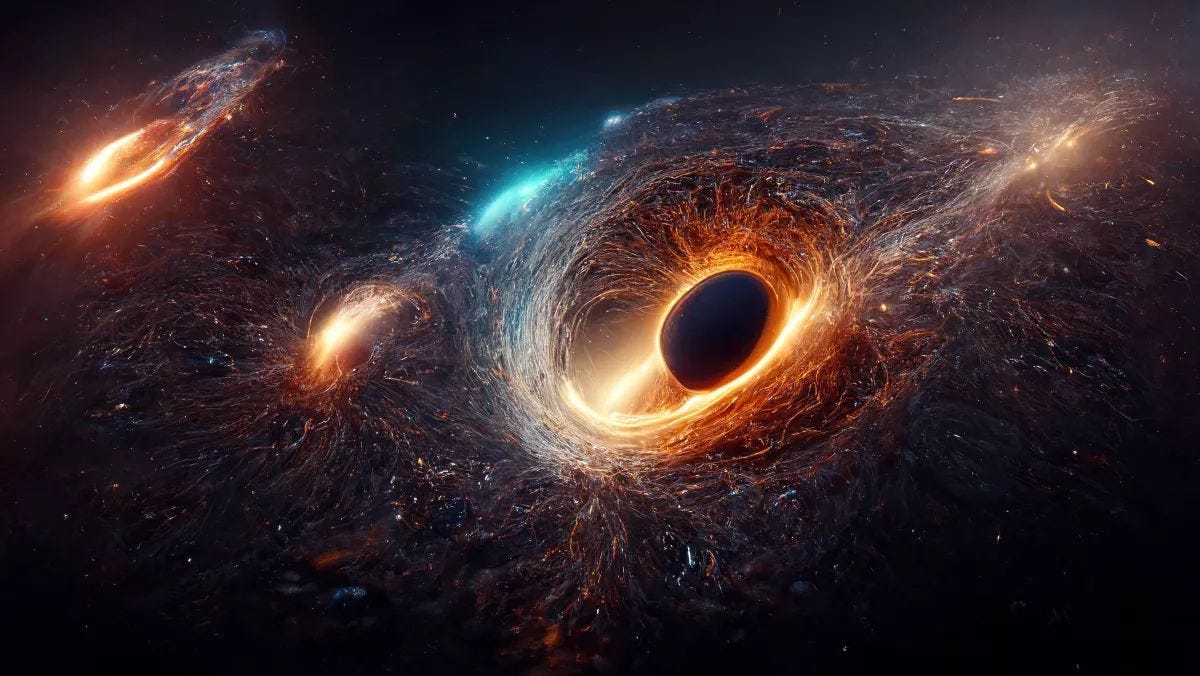Toronto, February 18, 2024
Why?
Sometimes, when you’re in the endgame, it’s a good idea to put aside quotidien concerns that clutter the mind, such as where in the apartment Schrodinger the cat is hiding. Time to pull up a chair by the winter fire, pour a single malt scotch, and consider the questions that really matter.
There’s an eccentric new (2023) book by the philosopher and wacky panpsychic Philip Goff, called Why? the Purpose of the Universe. Goff divides his book into easy parts and hard parts and invites impatient or lazy readers to skip the hard parts. What a good idea! Thank you, Philip Goff. More authors should employ this helpful technique.
Goff begins by asking the big question that keeps all of us up at night: What’s the point of living? One answer is that there is no point. The universe will ultimately come to nothing, and so our lives have no cosmic significance. “All matter will be swallowed up by black holes, black holes that will eventually evaporate away. This will be the beginning of an infinitely long period in which all activity and interaction has ceased.” So, if that’s what’s going to happen, why bother about anything?
A different answer, favoured by Goff, is that the universe has purpose despite its ultimate fate of nothingness. Contributing to the realization of this purpose gives cosmic meaning and value to individual lives. How do we know the universe has purpose? You’ll have to read the hard parts of Why for Goff’s full argument, but suffice it to say that he is super-impressed by the fine-tuning of the cosmos.
“Fine-tuning” refers to the claim that the existence of life depends on the constants found in the standard model of particle physics. Almost any change in those constants, however small, would preclude life. How can numbers that essential and precise be an accident? They must be an expression of purpose. What is that purpose? Goff rather arbitrarily says it’s to permit and encourage the emergence of life, of rational organisms, and eventually of new and unfathomable forms of existence. Who gave the universe this purpose? Perhaps there is a cosmic designer, e.g., God (only one of many designer possibilities), or maybe, mysteriously, the universe itself has consciousness. Goff, as a panpsychic, prefers the latter incomprehensible view.
A decade before Goff’s treatise the American journalist Jim Holt published a better book covering much the same ground, called Why Does the World Exist? (Interestingly, Goff makes no mention of Holt and does not even include Holt’s book in his otherwise commodious bibliography.) Holt addresses the sublime question, which has bedevilled philosophers and scientists, and to which all agree there is no answer (“it’s too big for science to explain”): Why is there something rather than nothing?
Scientists agree that the universe came into existence 13.7 billion years ago in an event known as “the Big Bang.” The Big Bang theory leads to another question: How could something have arisen from nothing? Further problems follow, explicated entertainingly by Holt. What, if anything, preceded the Big Bang? Nothing? Isn’t nothing something? Was God responsible for the Big Bang? Where did God come from? Answer given by some: God exists by his very nature and is self-explanatory and imperishable.
Meanwhile, Schrodinger the cat has turned up and is sitting by my side. He’s not interested in these issues. My scotch is almost finished. The big questions have been asked. Time to go to bed.
Note to readers
Alert readers will have noticed that there was no newsletter last week. That’s because I was in hospital with pneumonia. Although I’m almost an octogenarian, this was my first ever hospital stay. I will tell about this interesting experience in the next couple of newsletters. No flowers, please, I’m feeling better, although I still wonder why there is something rather than nothing.




This is profound,so much so I feel a little likeS hrodinger.
I hope Schrodinger has an OHIP card.
Things we experience through the filter of our minds are localized modulations of Consciousness, the only reality.
Our purpose is to be the eyes and ears of C (or God) in order that it can be self-aware.
Rupert Spira